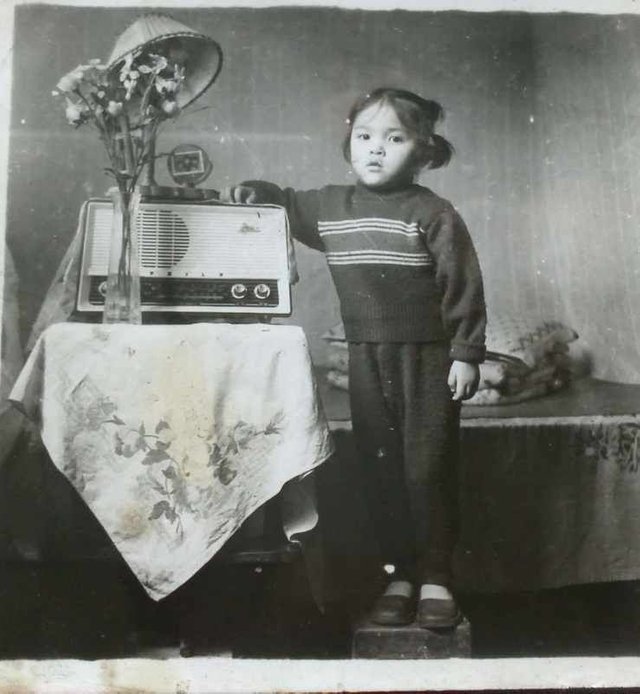Memoirs of Growing up in China – A Story About My Exile to My Mother’s Hometown Part 1 //中国回忆录 --关于我被放逐到妈妈的老家的故事 第一部分
Hi, Steemit friends. I hope you continue to enjoy reading my stories of growing up in China.
Stemmit的朋友们,你们好!我希望你们继续喜欢阅读有关我在中国的成长经历的故事。
In 1969, the relationship between China and Soviet Union worsened. The top leaders of the Chinese government were concerned that Soviet Union might use nuclear weapons on the big cities of China. As a protective measure, all cadres at the South West Bureau (the highest government administration bureau in South West of China) where my father worked were instructed to disperse among the big mountains in west Sichuan for several months. School age children could follow their parents to the mountains and continue their study in the temporary schools. My family at that time lived in the assigned government compound, an enclosed community with one high rise building of three storeys, about a dozen single-storey houses surrounding a big courtyard and two fields. There were about fifty house-holds who lived in this community and all of them were my father’s colleagues. Everyone was busy preparing for the departure to the mountains and I heard grown-ups talking about the war. One day I put on a military satchel and ran to my father and asked him excitedly: “Father, father, is it going to be a war?” My father looked at me with sad eyes and did not know how to answer my question. He and my mother were trying to figure out what to do with me during the time of this disperse. Since I was only five and half, I was too young to be allowed to join my father and my two sisters to the mountains. My mother had her regular full time job in the suburb of Chengdu. Right at the time when my parents were at loss of what to do with me, my mother’s female cousin from her hometown Neijiang came to pay a visit to my mother before she returned to her home in Neijiang after a short visit in Chengdu with her own brother. My mother’s cousin whom I called “San Niang” (No. 3 Aunt) offered to take me back to Neijiang with her. Neijiang was a county south east of Chengdu and it took about four hours by train from Chengdu to Neijiang. My parents accepted San Niang’s offer and agreed to send money to her every month to take care of me.
I don’t remember my parents said anything to me about what was happening. I only remember my mother left for her work after the weekend and my father walked me and my San Niang whom I just met on the weekend to the bus station. He helped us get onto the bus but did not get on himself. He then waved “good-bye” to me. I panicked and cried on the bus watching my father’s figure disappearing into the crowds.
When the bus reached its final destination – Chengdu Train Station, San Niang and I struggled to get onto an over-crowded train. There was no seats for us and we had to sit on the floor with a big crowd. I was overwhelmed with fear, confusion and sadness. I cried so hard and started to throw up on the train. San Niang tried her best to comfort me and I finally fell asleep in her arms. By the time the train arrived in Neijiang, the train was so crowded that San Niang and I couldn’t even get to the door to get off and Neijiang was not the final destination. San Niang begged a passenger on the train to help her. She got off the train by climbing out of the narrow window first and the passenger she talked to before-hand lifted and transported me out of the window and I managed to land safely into San Niang’s outstretched arms underneath the window.
This was how I arrived in Neijiang and started my exile at my mother’s hometown at the age of five and a half.

A photo of me taken at home in Chengdu when I was close to five.
我快五岁时在成都家里的留影。
中苏关系在1969年进一步恶化。中国政府的最高领导人担心苏联会在中国各大城市使用核武器。作为防备措施,我父亲所在的西南局(当时西南地区最高行政单位)得到指示将所有的干部都疏散到四川西部的大山里几个月。学龄儿童可以跟随父母疏散,可以在大山里临时学校继续上学。我家当时住在西南局宿舍大院。大院里有一栋三层楼的楼房和十几间围绕一个大院子和两个棉田的平房。院子里大概有五十几户人家,都是我父亲在西南局的同事。那时家家都忙于准备疏散,我也常听到大人们谈起“打仗”一词。一天,我背上一个军用挎包, 兴奋地跑到我爸爸跟前问他:“爸爸,爸爸,是不是要打仗了?”我爸爸用悲哀的眼神看着我,不知如何回答我的问题。他和我妈妈正愁着在疏散期间如何安置我的事情。因为我当时只有五岁,年龄太小不能随我爸爸和两个姐姐去山里疏散,我妈妈又在成都郊外的单位上有一份全日制工作。正当我父母为此事着急的时候,我妈妈老家内江的一个表姐来成都探望自己的弟弟,临别前来我家探望我妈妈。我妈妈的表姐(我称她为三孃)主动提出帮忙,她说她可以把我带回内江,帮助照看我一段时间。我父母接受了三孃的提议,同意每个月给三孃寄抚养费。
我不记得我父母当时告诉了我将要发生什么事情。我只记得我妈妈周末后独自回到了她的工作单位,我爸爸陪着我和我刚认识了一天的三孃去了公交车车站。他把我送上公交车后自己没有上车,车门关后他挥手给我告别。我当时非常害怕,开始在车上哭了起来,眼巴巴地看着我爸爸消失在人群中。
当我和三孃到达终点站成都火车站后,我们花了九牛二虎之力登上了极端拥挤的火车。火车上已经没有座位,我和三孃和一群人坐在地板上。我当时心里充满了恐惧, 困惑和悲哀,一直不停地嚎啕大哭,过度的伤心导致我在火车上呕吐。三孃尽力安抚我,我终于在她怀里睡着了。当火车到内江站时,三孃和我根本没有办法挤到火车车门前。三孃请求车上的一乘客帮助她。她先自己从狭窄的窗户爬下去,车上的那乘客把我抱起来,从同一窗户把我递出去,三孃站在窗户下伸出双臂安全地把我接住。
我就这样到了内江。开始了在我妈妈老家的放逐生活。当时我只有五岁半。
What a story! Im glad that I took the time to read it.
Thank you for taking your time to read my story!
No worries. Im glad that I read it. Its great to hear peoples growing up stories from different cultures
You pay attention to me, I pay attention to you, you come to me.你关注我,我关注你,你来我往
谢谢!
My mon was born in 1961, so maybe you're in a similar age.
Thank you for sharing this story, and I'm looking forward your next post.
We are similar in age. Thank you for taking your time reading this story. I hope you like my next post.
因为独立,所以坚强
the work of brother is very good, I want like brother how there is a way let me work as good as brother
Nice write up the story is full of memories
Thank you!